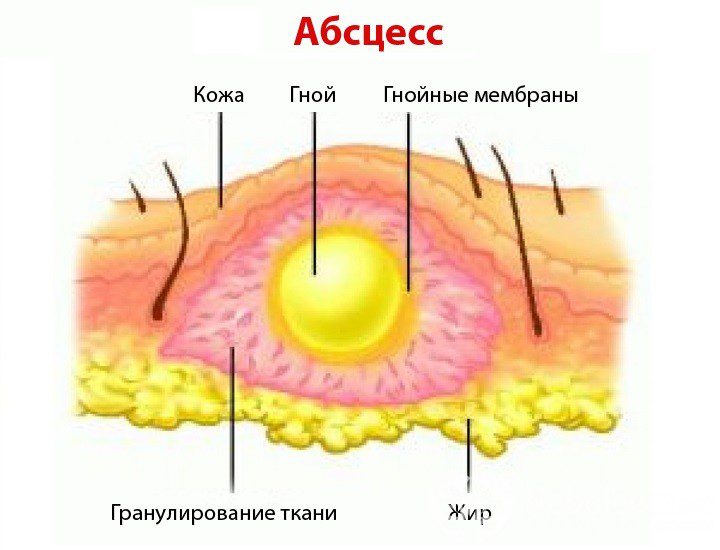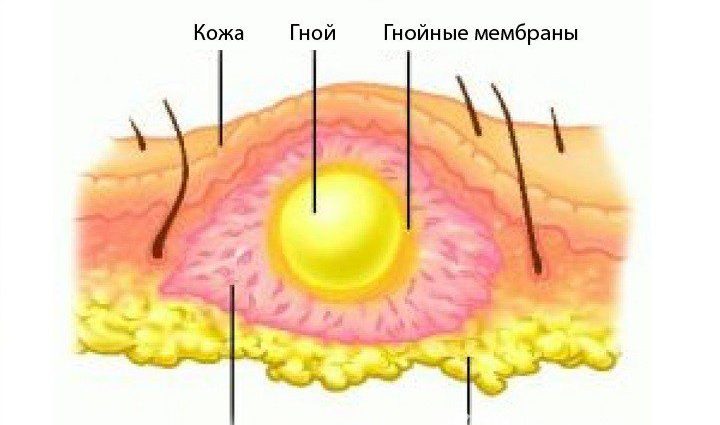cuntenutu
What is an abscess?
An abscess (abscess) is a local accumulation of pus that appears due to an acute or chronic local infection, as a result of which the destruction of tissues in the focus begins. An abscess develops with inflammation of the skin or tissue under it after the penetration of microbes through abrasions, injections, wounds.
A characteristic feature of an abscess is that the tissues adjacent to the focus of inflammation create a kind of wall-membrane that separates the infected area and limits the abscess process and tissue death, which is a protective reaction of the body.
There are many types of abscesses: soft tissues, paratonsillar, pulmonary, post-injection and even brain abscess. But, regardless of their location, abscesses are always accompanied by pain and bring a lot of inconvenience.

Causes of abscess
Most often, an abscess occurs due to a focal bacterial infection, mainly staphylococcal, as it leads to a weakened immune system and reduces the body’s ability to fight disease.
There are many ways for microbes to enter the body and ways for the occurrence of abscesses: microscopic damage to the skin, suppuration of the accumulation of outflowing blood (hematomas), the spread of infection from a local focus, as well as boils, cysts, purulent infections and much more.
An abscess may occur due to the ingress of chemicals under the skin, as well as after medical procedures (subcutaneous infusions, injections) performed without observing aseptic rules.
Abscess symptoms
There is a possibility of an abscess both on the skin and on any organ or tissue. Abscesses of internal organs are the most difficult to diagnose, and externally visible abscesses are located in the dermis, in the muscles or in the tissue under the skin.
The first sign of an abscess is the appearance of a painful, hard nodule and redness around it. After a few days or weeks, a capsule filled with pus forms at this site.
Symptoms of an abscess coincide with typical manifestations of purulent-inflammatory processes, regardless of their location. As a rule, this is general weakness, malaise, high body temperature (in especially severe cases up to 41 °).
The final phase of the formation of an abscess is often its spontaneous rupture, leading to the release of pus. With superficial abscesses, pus goes out into the external environment and, in the case of complete cleansing, the abscess loses volume, subsides and, in the absence of negative influences, eventually turns into a scar.
With abscesses of internal organs, the release of pus into the body cavity can lead to the development of various purulent processes.
Areas where an abscess may appear
Prucedure curative:
Abscessu di buttock dopu iniezione
lung abscess
ascessu di gola
ascessu di u fegatu
ascessu dentale
Abscess treatment

For the successful treatment of an abscess, its early diagnosis is very important. Treatment of an abscess, regardless of the place of its occurrence, comes down to opening the capsule with pus and emptying it.
Most often, an abscess is the reason for surgery and hospitalization, but with small superficial inflammations, they can be treated on an outpatient basis.
With abscesses of internal organs (liver or lung), sometimes a puncture is made to remove pus and antibiotics are injected into the vacated cavity.
The last stage of surgical intervention for chronic abscesses is the resection of the organ along with the abscess.
After opening, the abscess is treated in the same way as purulent wounds. The patient is provided with rest, good nutrition, it is possible to prescribe a transfusion of blood products, or its substitutes. A course of antibiotics is prescribed only taking into account the sensitivity of the microflora to them. Particularly careful in the treatment of abscesses should be people suffering from diabetes, as they will need a complete correction of metabolism.
With timely treatment of abscesses and correctly performed surgical intervention, the percentage of complications is minimal. But a neglected, undrained abscess can turn into a chronic form or lead to the spread of infection to healthy tissues. A fistula may form at the site of a poorly cleaned abscess.
An abscess is a surgical disease, therefore, to avoid unwanted complications, at the first sign of it, you should consult a doctor.










